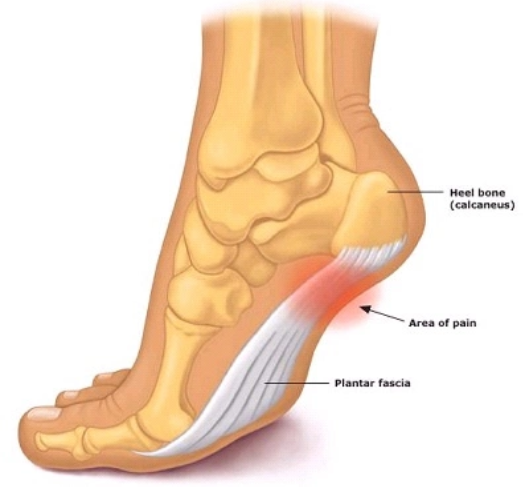Are steroid injections and nonsteroidal anti-inflammatory drugs really the only options for Plantar Fasciitis treatment?
Medica Institute offer minimally invasive, non-surgical, safe alternatives for Plantar Fasciitis treatment to get your life back on track without medication or steroid injections!

Plantar fasciitis is a painful and debilitating condition that primarily affects athletes, people whose jobs require them to stand for long periods of time, and those who put heavy stress on their feet. It involves inflammation of the plantar fascia, the strands of connective tissue that run along the sole of the foot, linking the heel of the foot to the ball and toes.
The plantar fascia protects and relieves pressure from the bottom of your foot because it acts like a shock-absorbing bowstring. However, it can tear due to repetitive tension and stress. When it is stretched and torn, it becomes inflamed, resulting in plantar fasciitis.
The inflammation can be caused by trauma from an injury, or from overuse of the tissue. It usually manifests as sharp pain in the heel or sole of the foot and an inability to point the toes upward. If left untreated, it can lead to other and more severe orthopaedic conditions in the foot, shin, and knee.
How can Regenerative Therapy be used to treat Plantar fasciitis?
Traditional treatment for plantar fasciitis often required a combination of orthopaedic foot supports, physical therapy, and cortisone injections. Most people recover completely within a year. In extreme cases, surgery is used to release the tension on the plantar fascia.
However, the best way to actually heal the injury and provide long-lasting improvement is through orthobiologic Regenerative treatments such as Prolotherapy and Platelet Rich Plasma (PRP). For actual tears in the plantar fascia, mesenchymal cell treatment may also be a viable option. These treatments aim to stimulate the connective tissue’s ability to heal and regenerate the torn plantar fascia. This can permanently provide pain relief and prevent further damage as you continue to enjoy your daily physical activities.
These orthobiologic injections for plantar fasciitis often work better than the traditional cortisone shots, since they not only soothe the pain but can also promote regeneration of damaged tissue. Repeated cortisone shots can actually lead to further damage to the affected tendons, but the same is not true of stem cell-based therapy.
Prolotherapy
Prolotherapy is a non-surgical treatment that involves targeted injections. The solution used in this treatment contains a local anaesthetic and concentrated dextrose (steroids are not used), which stimulates the tissues’ natural ability to repair.
Afterward, this may be followed by a stem cell treatment to aid in regeneration. Read about Prolotherapy here.
Platelet-Rich Plasma Therapy
There is another non-surgical treatment for plantar fasciitis which involves platelet-rich plasma. This stimulates the tissue to release growth factors and attract other cells.
This is especially useful for helping stem cells concentrate on the damaged area of the connective tissue.
It is an autologous procedure where the platelets are harvested from the patient’s own blood. After separating the platelets in a centrifuge, it is injected into the source of pain or point of injury.
The key is to provide the treatments to not only the Plantar Fasciitis, but also the ankle when necessary. If you had a previous ankle injury, it is essential to heal both injuries to the point where the foot can return to normal, healthy function. That is the path to returning to all of the activities you enjoy that depend on a strong, painless foot and ankle.
Read more about Platelet-rich plasma – PRP therapy here.
In certain cases it may be a combination of more than one treatment protocol. For some patients however, the complete protocol is a series of injections in several treatment sessions. The choice of treatment is at the discretion of the Consultant and is based on your unique case. This treatment may however not be suitable for all patients and only after review of your individual cases can the Consultant be able to discuss your options. Please contact us for a consultation and complete assessment to determine whether or not your condition can be treated with these minimally invasive, non-surgical regenerative procedures.
Is this Treatment Safe?
Regenerative Therapy for plantar fasciitis is a safe alternative to surgery and other traditional plantar fasciitis treatments. Since we only use Cells and PRP that were harvested from the same patient, the risk of infections or rejection is virtually non-existent.
What are the top Benefits of Non-surgical Regenerative Treatments?
With so many options out there, you may be wondering what benefits choosing Non-surgical Regenerative Treatments provides. Over all Regenerative treatments are minimally invasive, non-surgical same day procedures with no risk of rejection, minimal recovery time and minimal worry. You are fully awake and ready to go home within a few hours after injections in the affected area.
Here are the top benefits to be aware of:
